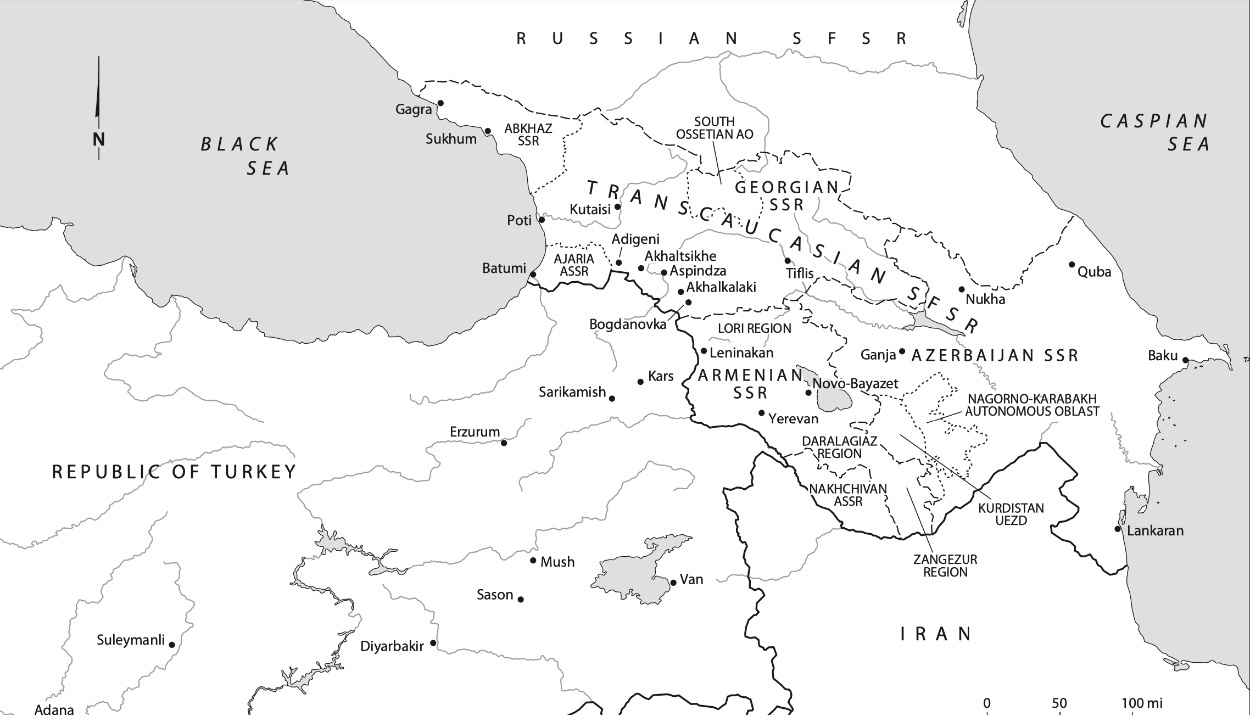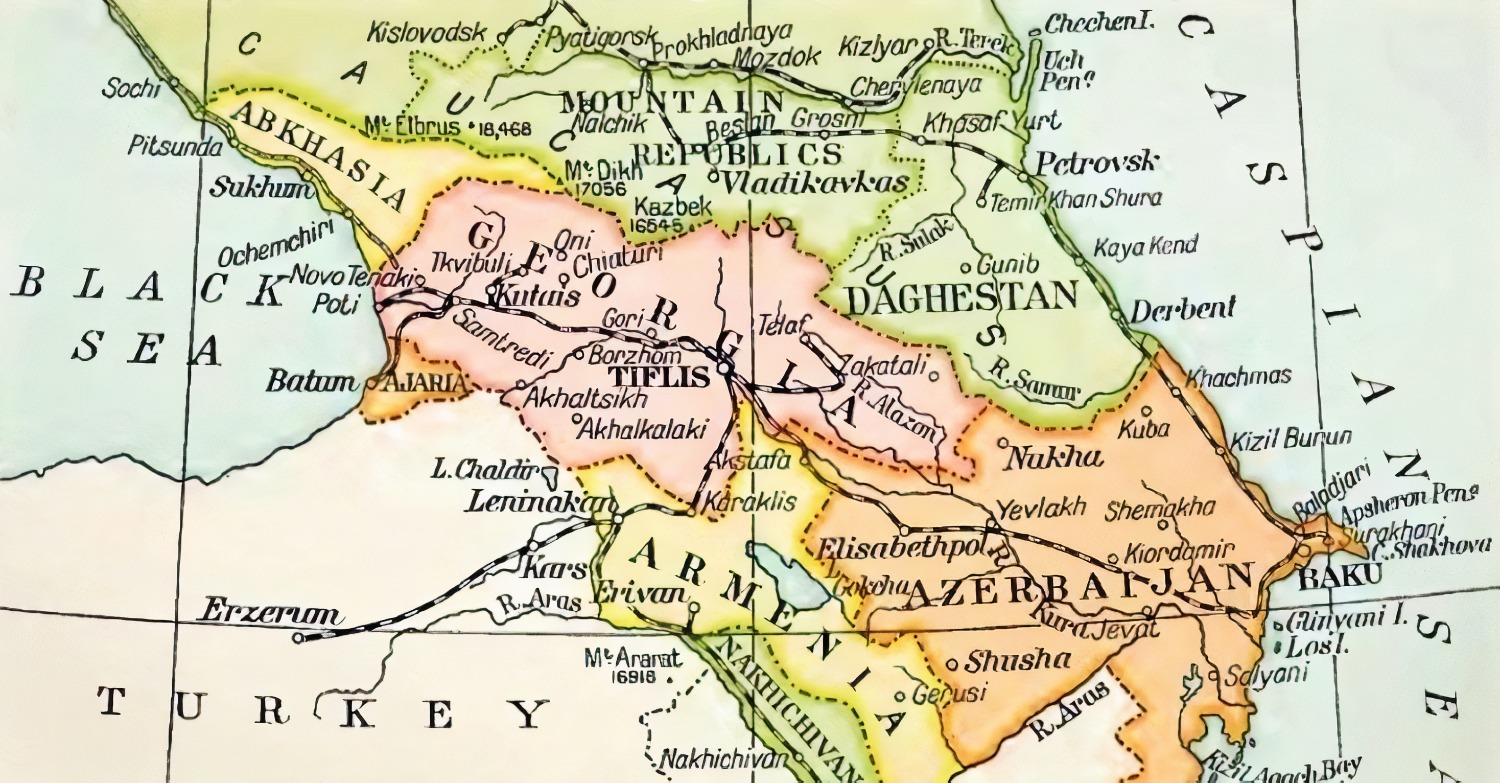A century of Sovietisation, or How Abkhazia became a republic, by Vitaly Sharia

One of the first rallies in Sukhum following the establishment of Soviet power on March 8, 1821.
Ekho Kavkaza -- On 4 March 1921, Soviet power was established in Abkhazia. It is not difficult to imagine with what pomp the centenary of this and similar dates would be celebrated in the South Caucasus — in April 2020 in Azerbaijan, in November of the same year in Armenia, on 25 February 2021 in Georgia, and today in Abkhazia — if the Soviet regime and the USSR had not, as they say, departed this life three decades ago...
In the current realities in Tbilisi, the said date was remembered as "the mournful anniversary of the Soviet occupation"; as for Yerevan, judging by the publications in the media, it is still mostly recalled in a positive way, since Sovietisation saved Armenia from continuing military confrontation with a hostile Turkey. In Baku, the attitude towards Sovietisation is rather neutral. It is noteworthy that all this corresponds to what historians write about the events of a century ago: in Azerbaijan and Armenia, the so-called Sovietisation took place relatively painlessly, whilst the Georgian Democratic Republic most fiercely resisted the advance of the Red Army.

Map: Soviet Caucasus, 1920.
Abkhazia, in spite of geography, became the last corner of the South Caucasus, or, as they used to call it since the time of the Russian Empire, Transcaucasia, which Soviet power, that is, the advance of the 11th Red Army, reached. In independent Abkhazia, this date is celebrated, unlike the Soviet past, modestly (in recent years, perhaps more often they remember that 4 March, quite coincidentally, is the birthday of Sergey Bagapsh and the death of Vladislav Ardzinba), but is viewed as a positive overall historical milestone. It is not difficult to explain this again in the light of the national question, for the Abkhazians en masse perceived in 1918-1921 the struggle of the Bolsheviks for Soviet power as a struggle for liberation from the power of Georgia. It is noteworthy that, taking this into account, the Bolshevik leadership in Moscow took an extraordinary step, at first granting the tiny republic the status of the SSR of Abkhazia, at a time when much larger republics were then autonomous.
+ Abkhazia—Documents and Materials (1917–1921)
+ Declaration adopted by the Abkhaz people’s Congress, 8 November 1917
+ Abkhazia, Georgia and the Caucasus Confederation, by Stanislav Lakoba
+ The Treaty between Abkhazian National Congress and Georgian National Congress | 9 February 1918
+ Telegram from the Revolutionary Committee of Abkhazia of March 26, 1921
The day before yesterday, 2 March, at the Abkhazian Institute for Humanitarian Research with the participation of representatives of the North Caucasian Federal University, a scholarly conference "Soviet Power: Historical Experience and Modern Comprehension" was held. This was the only event on a republican scale relating to this topic, but it is noteworthy that the President of the Republic, Aslan Bzhania, made a speech of welcome to the participants of the conference. He said:
“The establishment of Soviet power in Abkhazia is an essential and integral part of history, which for decades determined the political, economic and cultural development of our republic. The study and comprehension of Soviet statehood is acquiring today not only theoretical but also practical significance. I am convinced that it is necessary to maintain the temporal link, respect all periods of our history, and draw the right lessons from the past."
One of the main speakers at the conference was Associate Professor of the Department of History, Archaeology and Ethnology of the Abkhazian State University, Senior Researcher at AbIGI, Candidate of Historical Sciences, Soslan Salakaya. Speaking of the fateful events of a century ago, he noted:
“On 16 February, the Revolutionary Committee of Georgia is being formed. But the instruction was given: ‘Do not forget about Abkhazia.’ And then on 17 February 1921, the Revolutionary Committee of Abkhazia was created, which included Efrem Alekseevich Eshba as chairman, Nestor Lakoba and Nikolay Akirtava as members of this revolutionary committee. Since Eshba and Lakoba were at that time in Turkey on a special assignment, Nikolay Akirtava became the actual leader of the revolutionary committee."
+ Efrem Eshba: revolutionary and fighter for the idea of Abkhazian statehood
+ Declaration of the Revolutionary Committee of the SSR of Georgia on Independence of the SSR of Abkhazia - 21 May 1921
+ Resolution of the First Congress of the Workers of Abkhazia on the Report of Revcom Chairman E. Eshba on Building of Soviet Society, 28 May 1921
+ Union Treaty Between the SSR of Georgia and the SSR of Abkhazia - 16 December 1921
+ Constitution of the Soviet Socialist Republic of Abkhazia, 1 April 1925
Let us clarify that Moscow's "special task" was to establish contacts with the Kemalist leadership of the Turkish Republic on the subject of the fate of Adjara. And furthermore, it was just the other day that, at the age of 86, the daughter of Akirtava Irma Nikolaevna, well-known to many in Abkhazia, passed away.
After the conference, ‘Ekho Kavkaza’ contacted Soslan Salakaya for a short interview, which we agreed on last week. Here's what Salakaya said:
“Despite the fact that time has passed since this event was widely celebrated, this is indeed one of the most important dates in the history of Abkhazia, because it is actually the restoration of the statehood of Abkhazia. And Soviet power, the Soviet era, despite numerous disadvantages, brought advantages that were no less numerous: the development of the economy, culture, science, a lot of positive things.”

Map: From the book: Trans-Caucasia by Harold Buxton (1926).
- You started talking about the pros and cons of what the Soviet government gave Abkhazia. Let's take a closer look at this.
- Among the minuses are, first of all, the repressions of the thirties. Well, and not only, but mainly in the thirties. The murder of the leaders of Abkhazia. And not only leaders, but also representatives of the intelligentsia, the peasantry. Inclusion in Georgia, the resettlement policy, which led to a sharp change in the ethnic situation, infringement of the national rights of the Abkhazians. Well, as for the pluses, we can attribute at least general secondary education ... We take it for granted, but ... The development of Abkhaz literature, language, theatre. All of our, by and large, culture, all the art that we can be proud of, all of this was formed or, at least, actively developed precisely during the Soviet era."
Then Soslan Shotovich and I talked about the fact that the nostalgia for the Soviet past, which is now popular in Russia, has spread to part of Abkhazian society. I gave an example when a Sukhum Facebook activist who fought with arms for the freedom of Abkhazia in 1992-1993 lamented recently about the collapse of the USSR - clearly not thinking that under Soviet conditions the Georgian ethno-demographic expansion in Abkhazia would inevitably continue. Moreover, the calculations that Abkhazia would have achieved restoration of the union-republican status within the framework of the Soviet Union is an absolutely groundless illusion. Is it likely that the Georgian authorities and society would humbly accept such a thing? Suffice it to recall how Tbilisi reacted violently only to the raising of this question at the Lykhny gathering on 18 March 1989! Soslan Salakaya said:
“No, I say, this was, without a doubt, that real, biggest minus for the Abkhazian people in Soviet times - because the percentage of the Georgian population in Abkhazia would have increased and the percentage of Abkhazians would have decreased. And even if all the rights of the Abkhazian people had been formally preserved, in reality there would soon have been no-one to defend them. They would simply put in place the leaders of Abkhazia they needed by voting for them.”
Social and political figure and prose-writer Astamur Kakalia drew attention to an interesting point yesterday in his Facebook post: “Tomorrow is the centenary of the first Abkhazian republic. This is a very important historical date. For the first time, 100 years ago, Abkhazia became not a principality, not a kingdom headed by a king, not a union of tribes under the leadership of different leaders, but a country with the highest form of statehood - a republic."
Vladislav Ardzinba's speech at the 1st Congress of People's Deputies of the USSR in 1989 (With English subtitles)
English transcript
And also - regarding the restoration of the statehood of Abkhazia (after the abolition of the Abkhazian principality in 1864). The leaders of the Communist Party of the Republic of Abkhazia managed to achieve the establishment of the 4th of March only as a working day for commemoration about two decades ago, even though they sought to give it the status of a festive day off work, as the very day of restoration of statehood. However, the famous Abkhazian historian Stanislav Lakoba objected on the grounds that a different date was the day in question, the Abkhazian SSR having been proclaimed on 31 March 1921.
This article was published by Ekho Kavkaza and is translated from Russian.